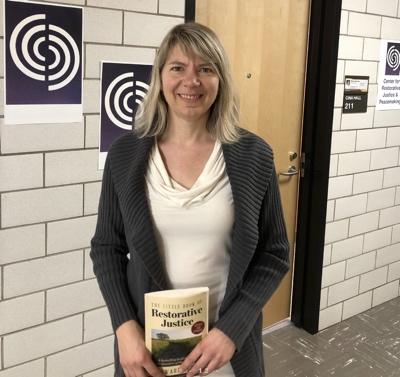A local high school student is struggling with disruptive behavior, and the threat of expulsion looms. The school social worker is looking for a different approach, one where the student can feel understood and guided rather than simply punished. She believes a new program on the Duluth campus has a possible solution: restorative justice.

Dr. Emily Gaarder (Anthropology, Sociology, and Criminology), a restorative justice practitioner and researcher, is ready to assist. Gaarder agreed to help the social work team brainstorm how they might create a restorative circle.
In restorative justice, the people most affected by a harmful incident are part of a conversation and decision making process together. Those affected have the opportunity to say how they were harmed and how they would like to move forward. The person who caused harm is actively involved in repairing it.
“Restorative justice isn’t about teaching something you don’t already know,” Gaarder says, “It’s about providing space to talk about conflicts and do problem solving together.”
The Center for Restorative Justice & Peacemaking (CRJP) was founded at the University of Minnesota in the Twin Cities in 1994 by Dr. Mark Umbreit. Their work is powerful and covers a wide range of situations, from facilitating post murder dialogues between family members and the offender, to helping heal conflicts in workplace and school settings.
They provide research, consultation, and training for restorative justice practitioners and programs worldwide. They have partnered with city governments to improve police and community dialogue while also helping cities establish restorative justice programs.
As a way to strengthen its base of operations and expand its scope of work, CRJP has come to Duluth but does it work? Research suggests that many victims of harm feel more heard and satisfied with a restorative process. It also may reduce the likelihood of similar harmful acts in the future.
The UMD Library is receptive to taking parts of the CRJP archive, including hundreds of hours of videotaped victim offender dialogues. The archive offers the opportunity for undergraduates and graduates alike to conduct research.
There are existing restorative justice allies in the community such as Men As Peacemakers, which offers restorative circles for domestic violence and for youth who commit crime.
“The support for restorative justice is bubbling up here in Duluth,” Gaarder says. With launches such as this one, “you go with the energy that already exists.”
Gaarder brings fresh insight as the center director for the Duluth CRJP site. Other members of the Duluth CRJP team include Ted Lewis and UMD Associate Professor Dr. Scott Vollum (Anthropology, Sociology, and Criminology).
The center’s focus is to provide support and resources for people or groups seeking restorative methods to address crimes, harm, or traumatic incidents.
Conflict will always reside in communities classes, residence halls, offices, and in neighborhoods. Gaarder believes a restorative process can be used in any conflict, no matter how small or large an issue may seem to be.
“It’s something everyday people can use to solve everyday problems,” Gaarder says.
This semester Gaarder is working with the Office of Student Conduct and Conflict Resolution to create a club where students can be trained in restorative justice techniques.
“The CRJP program gives people the opportunity to use their voice in any situation,” Gaarder says, “and I’m excited to see it grow.”